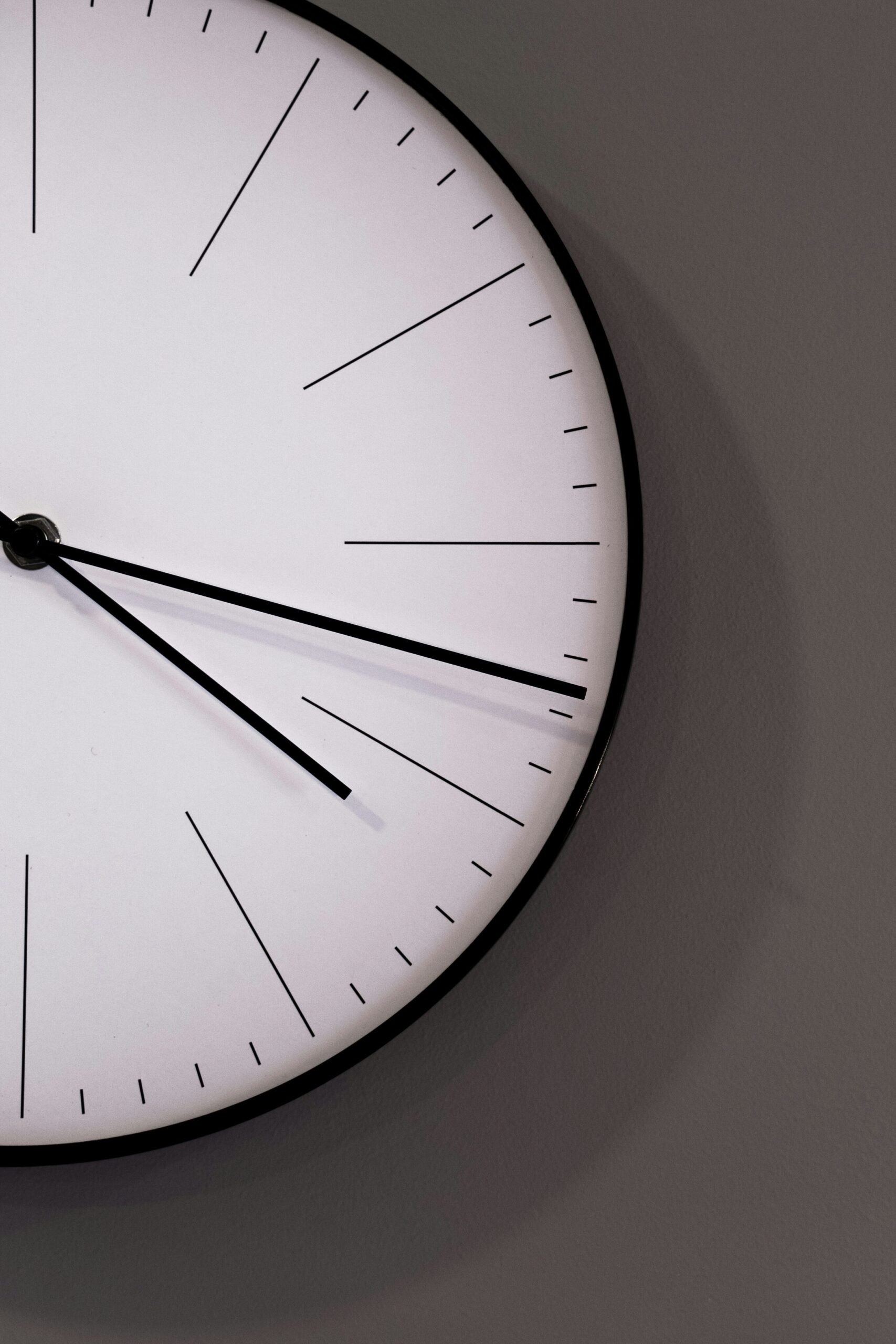x min read

“Clock” Images – Unsplash.com
Introduction
Most people online will tell you that you NEED hours of study time just to pull of a B, let alone an A.
And sure, if you’re someone that takes loads of rigorous courses in a top college/university, then yeah, that makes sense. Otherwise, there’s no need for you to be studying 5-8 hours per day just for an A. What you need is a better sense of how to actually study, not more time. More time serves you no good if you’re spending it like that.
The truth is, if you really do want the best grades of your life, you should be studying consistently for long periods of time over the course of a relatively long time (relative to the time you take XYZ test). But, it’s also a great way to waste your life. You could be doing so much more, actually enjoying life, and instead your spending that precious time studying? Studying of all things? Seriously?
Reality Check
If you want good grades, and want to spend as little time as possible actually studying, this is the worst method you can try. It will, and I repeat, WILL, get you nowhere. Sure, although studying for shorter sessions over the course of a longer period of time might help too, be honest, nobody has time for that.
Or, maybe you do. But, of course, it’s not efficient. It’s not the smart way. It’s the long, hard, and rough way to academic success. In other words, the crappy way to doing good in school.
Hours of Studying Doesn’t Equal High-Quality Studying
Let’s say that there are two students. One studies 3 hours every single day for a week, and the other studies for just 30 minutes 2 days in advance. Both students show up on exam day, and the first one gets an 95, while the other gets an 88.
Sure, although the student that studied longer got a 95, you can see that they didn’t outscore the second student by a large margin at all. They only did better by a mere 7 points. That’s it.
And more often than you’d expect, the student that studied less actually ends up doing better than the student that studied longer. Why? Because more time doesn’t equal better outcome. What gets you a better outcome is a smarter and stronger approach that’ll tackle everything you need smartly, efficiently, and quickly. It’ll give you the biggest bank for your buck (or however you say it) and will make every minute you spend reading, writing, or viewing anything a high-ROI move.
You’ve Been Lied To
Chances are that a majority of people online have told you that to do well on exams, you have to study months in advance, dedicate a few hours per day just for studying, and study even when it seems pointless to do good in school.
Look. You can always take this approach if you want. But, if you’re someone that cares about your time, even if you’re not the most productive person out there, then you need to understand that there are plenty more ways to do good in school aside from just mindlessly staring at a textbook, blindly taking notes, and just hoping that everything will suddenly make sense. It won’t.
My Experience
Before, I used to be just like the exact persona that I’m describing. I overworked myself to the point where I actually liked studying and completing schoolwork (the only benefit from what I did); so much so that I did them in my free time if I could.
For practically any class, if I had an upcoming test, I’d spend hours watching videos, taking notes, overviewing assignments and past tests, testing my short and long term memory, analyzing texts, and pretty much every lengthy and extensive study method out there that requires a bunch of time.
Before I entered in any ECs (extra curriculars), I would spend -on average- 3, 4, or even 5 hours in a single day solely studying for one test alone. I would study for Biology, history, math, and language exams as much as I could to ensure that I did good. And guess what? I did ok.
It was only until I joined after school clubs, and started participating in sports that I realized that I would no longer have as much time to study for quizzes or tests. So, what did I do? I stopped studying (or just cut down) my studying entirely.
The result? I did better. Before, I used to score average, or even poorly on my history and biology exams, and then suddenly, I started doing better. I studied less, made more time for other things, actually started enjoying high school and my life, and I just did better academically. My grades didn’t suffer, but instead they thrived. I found school easier, I didn’t work as hard, and yet I did better.

“Easy” Images – Unsplash.com
Then, What Should You Do?
Easy. Stop overworking your brain to the point that it’s just useless. If you want better grades, you have to understand what the actual smart ones are doing. Although I might’ve been considered as a smart student whose only hope was to good in school and thrive in the academic environment, I sure wasn’t the brightest one there.
More studying, a high GPA, and good grades doesn’t make you smart. They make you a better test taker and scorer, that’s for sure. But not smarter.
I was good at everything, but sucked at all of them. I had no real, applicable real-world skills. No experience. No useful knowledge. I was a liability that everyone considered a soon-to-be asset. I had to learn the hard way that I wasn’t all that special.
That’s where the story changes. Instead of doing what everyone else tells you, what everyone advises, you’re going to do things differently. That’s what creates generational wealth, and what’ll set you apart from everyone else. For that reason, we’ll apply the same thing to studying.
My 30 Minute Study Procedure To Ace Your Next Quiz
Before we begin, I must advise you that what I’m about to tell you doesn’t apply to an actual full-blown exam with loads of content and reading and summarizing, plus a lot of other stuff. Look, I’ll be completely transparent here. You can probably minimize the time you spend studying for any quiz or test of yours. But, if it’s a final exam, AP, IB, or any other major exam, you seriously should reconsider your life’s decisions and probably avoiding studying altogether. You’ll be less stressed that way.
Please Read
DO NOT, and I mean DO NOT use this for any major exam or test. You’re gonna need a lot more time to prepare for an exam of that importance. This advice that I will provide only applies to those in the optimal conditions, which I’ll name below.
- Minimal questions (5-15 questions)
- Easily available content material
- You have already gained some familiarity with the material
- In other words, you have already worked with it or have learned slightly about what you’re about to be tested on.
- Quiz is based on a unit/subject with easy, or medium-difficulty content in regards to how easy it is to retain information
Additionally, if you’re someone that isn’t very motivated, or can’t comprehend and retain information quickly, just stop. 30 minutes won’t be enough to retain everything, so give yourself more time (if it’s not too late).
The Procedure
- What are you learning? List out all the main ideas, concepts, or contents of importance that’ll be covered inside of your exam. (2 minutes)
- Briefly review what you already know. In my personal opinion, you should always go over the content that you already feel comfortable with so that you can solidify it in your head and assure that it stays there. (5 minutes)
- What don’t you know? Now, you have two options here: a) you can go through class material and attempt to make sense out of what you’re learning that way or b) you can leverage internet resources online, whether that’d be videos, blog articles, PDFs, digital texts, LLMs, or anything else of value help you learn (5 minutes)
- Learn, faster. Understand that taking notes with the time you have is completely irrelevant. Your goal is to get as much information as possible into that thick skull of yours. Stuff your brain with easily comprehendible content that will stick in your brain for a few hours on end. (time remaining)
My Personal Tip (how to learn anything faster)
If you’re interested, we have an entire post regarding how to master your learning style; which is crucial for this section.
Look. If you want to learn faster, you need to choose a way that suits your brain the best. Now, hopefully you knew this or are reading this beforehand, because you are going to need it.
In short, learning styles are the way in which you learn best. You might learn best through reading, or through audio, or through visuals, or through videos, or through experimentation and implementation. You can find a short test to discover your learning type online (there’s plenty of them online), and then tailor your learning within these next 30 minutes to maximize your study session effectiveness.
Tip: If your a kinesthetic learner, I suggest watching content online of others implementing XYZ and then talking about it so that you can receive a similar benefit (considering that you’re short on time).

“Experiment” Images – Unsplash.com
Conclusion
Learning is hard. But, it’s great. If you can maximize the most of every minute you spend trying to get your brain to work hard, you will have more time than you can imagine. 24 hours will feel a lot longer, and you’ll realize that the time you spend studying isn’t the problem, it’s your approach to studying. That’s why you can’t retain anything, why you can’t get anything done on time, or why you fail to do well on your exams.



